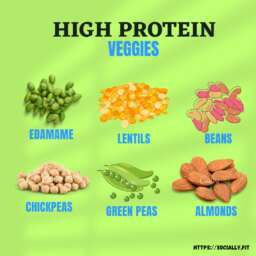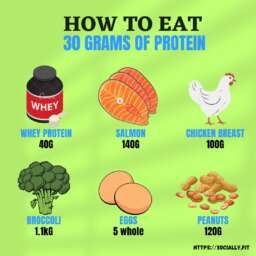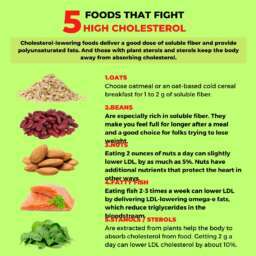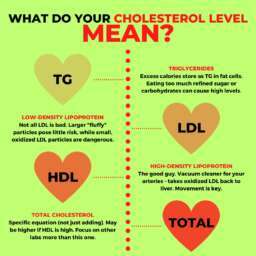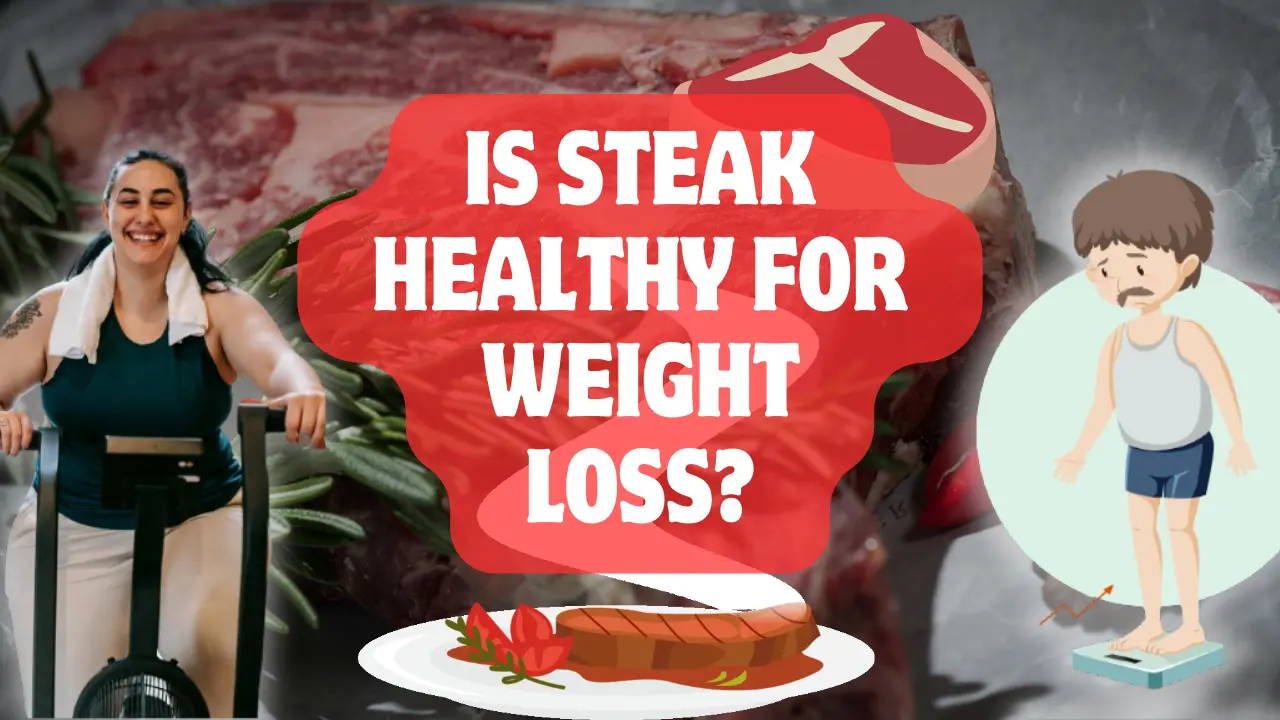If you’re on a quest to shed some pounds, you might have been told to steer clear of steak. After all, it’s often associated with indulgence rather than weight loss. However, the truth may surprise you. Let’s dive into the debate and uncover whether steak can indeed be a part of a healthy weight loss journey.
Debunking the Myth about Steak:
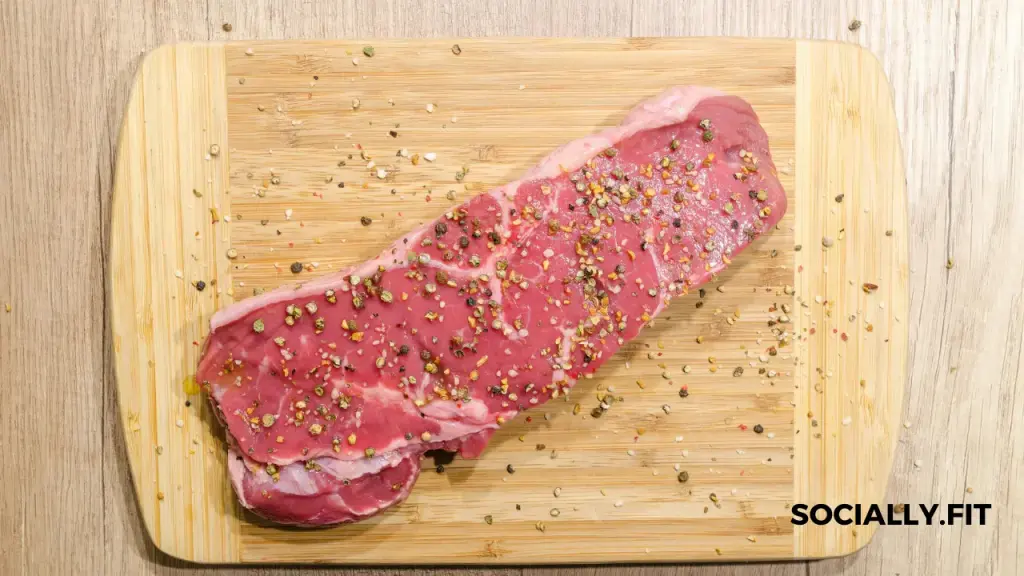
- Define the Debate: Start by understanding the common misconceptions surrounding steak and its relationship to weight loss. Identify the key arguments against including steak in a healthy diet.
- Understand the Nutritional Profile: Take a closer look at the nutritional composition of steak. Highlight its protein content, essential vitamins, and minerals, such as iron and vitamin B12, which are beneficial for overall health.
- Question Assumptions: Encourage critical thinking by questioning assumptions about steak’s impact on weight loss. Challenge the notion that all high-protein foods are detrimental to weight management.
Protein Powerhouse: How Steak Supports Weight Loss
- High Protein Content:
- Steak is renowned for its high protein content, making it an excellent choice for those aiming to lose weight. Protein plays a crucial role in various bodily functions, including muscle repair and metabolism.
- By incorporating steak into your meals, you can boost your protein intake, which is essential for preserving lean muscle mass, especially during periods of calorie restriction.
- Satiety and Reduced Caloric Intake:
- Protein-rich foods like steak have been shown to increase feelings of fullness and satiety, which can help curb cravings and reduce overall calorie intake.
- When consumed as part of a balanced diet, steak can contribute to a sense of satisfaction after meals, potentially leading to fewer instances of snacking or overeating throughout the day.
Is Steak Healthy for Weight Loss?
Micronutrient Marvel: Essential Nutrients in Steak

- Iron and its Role in Metabolism:
- Steak is a rich source of iron, a mineral essential for various metabolic processes in the body. Iron plays a crucial role in the production of hemoglobin, the protein in red blood cells that transports oxygen from the lungs to tissues throughout the body.
- Adequate iron intake is necessary for maintaining energy levels and supporting overall metabolic function. Incorporating steak into your diet can help prevent iron deficiency anemia and promote optimal energy metabolism.
- Vitamin B12 for Energy Metabolism:
- Another vital nutrient found in steak is vitamin B12, which is essential for energy production and metabolism. Vitamin B12 plays a key role in the conversion of carbohydrates into glucose, the body’s primary source of fuel.
- Individuals deficient in vitamin B12 may experience fatigue and reduced energy levels. Including steak in your diet can help ensure an adequate intake of this important vitamin, supporting overall energy metabolism and vitality.

Is Steak Healthy for Weight Loss?
Quality Matters: Choosing the Right Cuts
- Lean Cuts vs. Fatty Cuts:
- When selecting steak for weight loss, it’s essential to choose lean cuts over fatty cuts. Lean cuts of steak contain less visible fat and lower overall calorie content compared to their fattier counterparts.
- Opt for cuts such as sirloin, tenderloin, or flank steak, which are typically lower in saturated fat and calories. Trim any excess fat before cooking to further reduce the fat content.
- Grilling vs. Other Cooking Methods:
- The cooking method can also influence the nutritional profile of steak. Grilling is often preferred for weight loss as it allows excess fat to drip away from the meat, resulting in a leaner final product.
- Other cooking methods, such as pan-frying or broiling, may require added fats or oils, increasing the calorie content of the dish. Choose grilling or baking whenever possible to keep calorie intake in check while enjoying steak as part of a weight loss plan.
Is Steak Healthy for Weight Loss?
Steak and Satiety: A Key to Weight Management
- Impact on Appetite Control:
- Steak’s high protein content makes it an excellent choice for promoting feelings of fullness and satiety. Protein takes longer to digest than carbohydrates or fats, which can help keep hunger at bay between meals.
- Including steak in your diet can contribute to better appetite control, making it easier to stick to your weight management goals by reducing the likelihood of snacking on unhealthy foods.
- Avoiding Overeating with Steak:
- Consuming steak as part of a balanced meal can help prevent overeating by providing a satisfying and filling component to your plate. Pairing steak with fiber-rich vegetables and whole grains further enhances its satiating effect.
- Be mindful of portion sizes when enjoying steak to avoid consuming excess calories. Aim to include a palm-sized portion of steak alongside plenty of vegetables and other nutrient-dense foods to create a well-rounded and satisfying meal.
Is Steak Healthy for Weight Loss?
Moderation and Balance: Incorporating Steak into a Healthy Diet

- Balanced Meal Planning:
- When incorporating steak into your diet for weight management, it’s essential to practice balanced meal planning. This involves creating meals that provide a variety of nutrients while controlling portion sizes.
- Plan meals that include lean protein sources like steak, along with plenty of fruits, vegetables, whole grains, and healthy fats. Aim for a balanced mix of macronutrients to support overall health and weight management goals.
- Pairing with Fiber-Rich Foods:
- To maximize the nutritional benefits of steak and enhance its role in weight management, consider pairing it with fiber-rich foods.
- Fiber helps promote feelings of fullness and aids in digestion, making it an important component of a weight loss diet. Pairing steak with leafy greens, legumes, or whole grains can increase the overall fiber content of your meal and contribute to better satiety and digestive health.

Is Steak Healthy for Weight Loss?
Addressing Concerns: Common Misconceptions
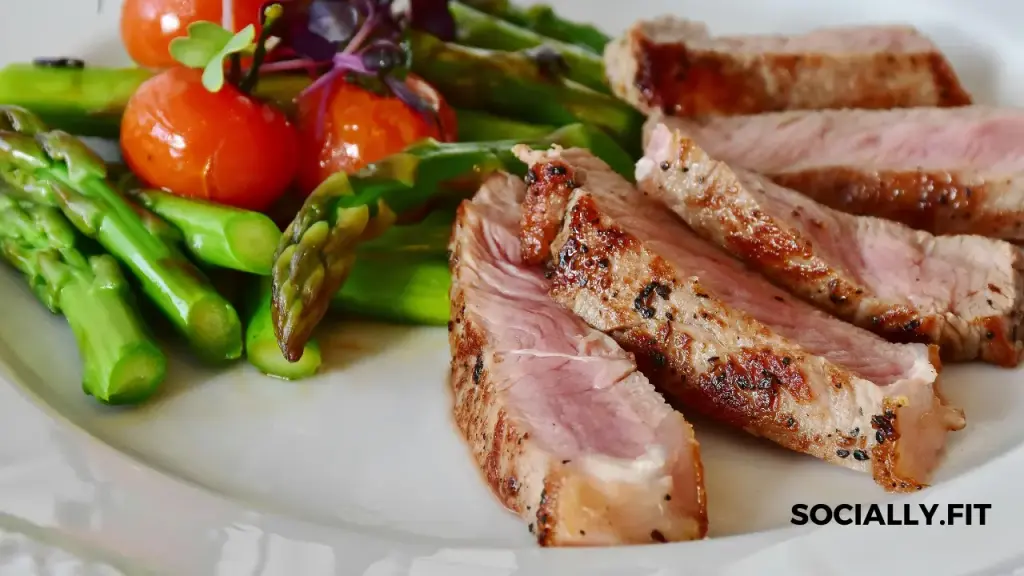
- Saturated Fat and Heart Health:
- One common concern about steak consumption is its high saturated fat content and its potential impact on heart health. While it’s true that some cuts of steak contain saturated fat, it’s essential to consider the overall dietary context.
- Moderation is key when including steak in a healthy diet. Choosing lean cuts of steak and trimming visible fat can help reduce saturated fat intake.
- Additionally, research suggests that the relationship between saturated fat and heart disease is more complex than previously thought. Focus on a balanced diet that includes a variety of nutrient-dense foods to support heart health.
- Red Meat and Cancer Risk:
- Another misconception surrounding steak is its association with an increased risk of cancer, particularly colorectal cancer. While some studies have suggested a link between red meat consumption and certain types of cancer, the evidence is not conclusive.
- It’s important to consider factors such as cooking methods and overall dietary patterns when interpreting research findings. Grilling or charbroiling meat at high temperatures may produce compounds that could potentially increase cancer risk.
- To minimize any potential risks associated with red meat consumption, opt for healthier cooking methods like grilling, baking, or broiling, and balance your diet with plenty of fruits, vegetables, and whole grains.
Is Steak Healthy for Weight Loss?
Conclusion: Embracing Steak in a Weight Loss Journey

In conclusion, steak can indeed be a valuable addition to a weight loss journey when consumed mindfully and in moderation. Despite common misconceptions, steak offers numerous nutritional benefits that support weight management and overall health.
With its high protein content, steak promotes feelings of fullness and satiety, helping to curb cravings. Additionally, steak is a rich source of essential nutrients like iron and vitamin B12, which are vital for energy metabolism and overall well-being.
By choosing lean cuts of steak, practicing balanced meal planning, and pairing steak with fiber-rich foods. Individuals can enjoy the benefits of steak while supporting their weight loss goals.
Incorporating steak into a balanced diet can contribute to a sustainable approach to weight management. Allowing individuals to enjoy delicious and nutritious meals while working towards their health goals. With moderation, balance, and mindful eating habits, steak can be a valuable ally in the journey towards a healthier lifestyle.
Is Steak Healthy for Weight Loss?
FAQs:
Can I eat steak every day for weight loss? Eating steak every day may not be the most optimal approach for weight loss. While steak can be a part of a healthy diet, it’s essential to vary your protein sources and consume steak in moderation as part of a balanced meal plan.
Is grass-fed steak better for weight loss? Grass-fed steak may have slightly fewer calories and more beneficial fats than conventionally raised beef. However, both types of steak can be part of a healthy diet when consumed in moderation and as part of a balanced meal plan.
How should I cook steak for weight loss? For weight loss, opt for healthier cooking methods like grilling, baking, or broiling instead of frying or pan-searing. Trim any visible fat before cooking to reduce calorie intake, and avoid adding excessive oils or fats during the cooking process.
Can steak be part of a low-carb diet? Yes, steak is naturally low in carbohydrates, making it suitable for low-carb diets like keto or Atkins. However, it’s essential to balance your intake of steak with other nutrient-rich foods to ensure a well-rounded diet.
Are there any alternatives to steak for weight loss? Yes, there are plenty of alternatives to steak for weight loss. Lean protein sources such as chicken breast, turkey, fish, tofu, and legumes can also support weight loss goals when incorporated into a balanced diet.








